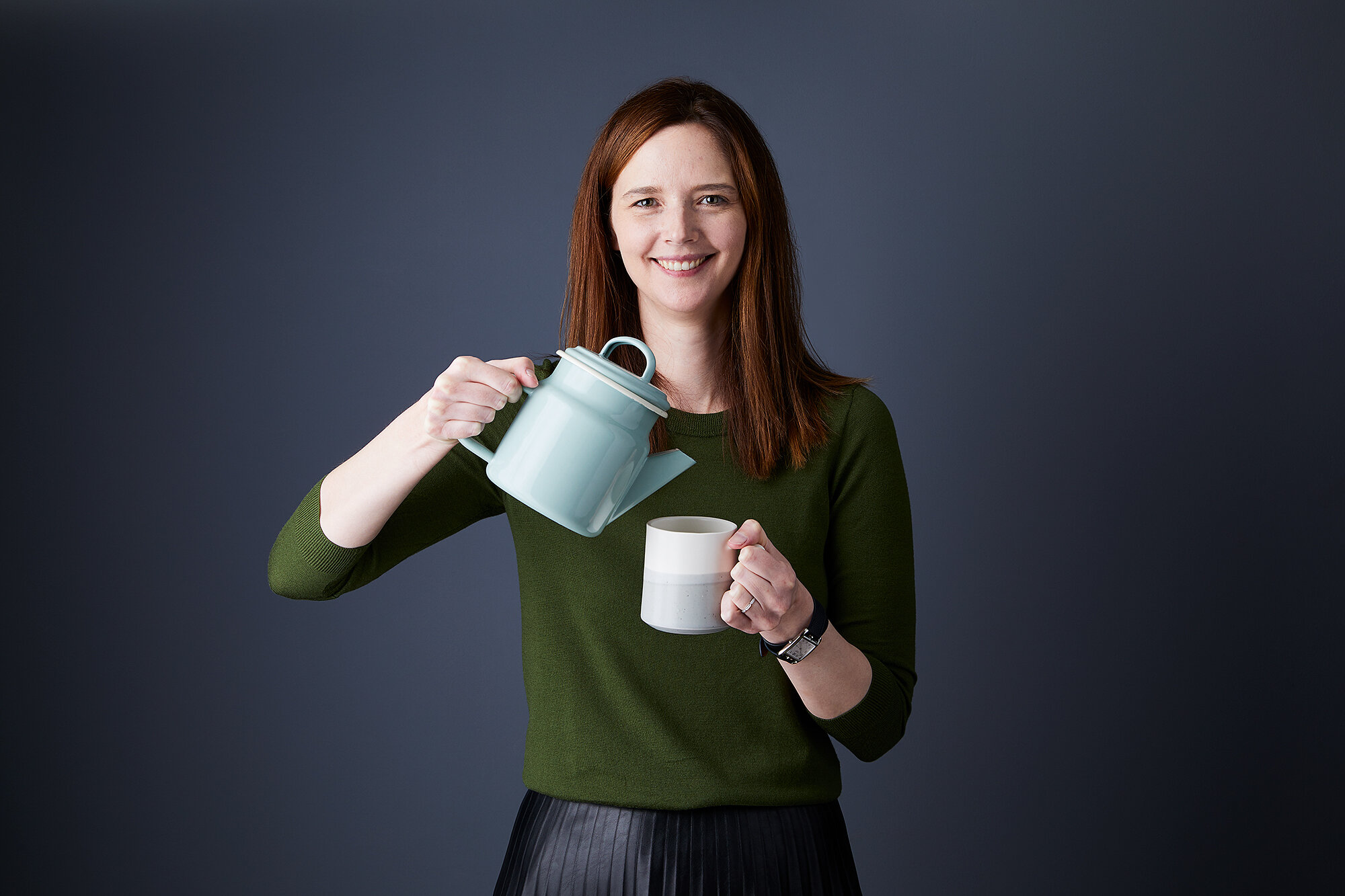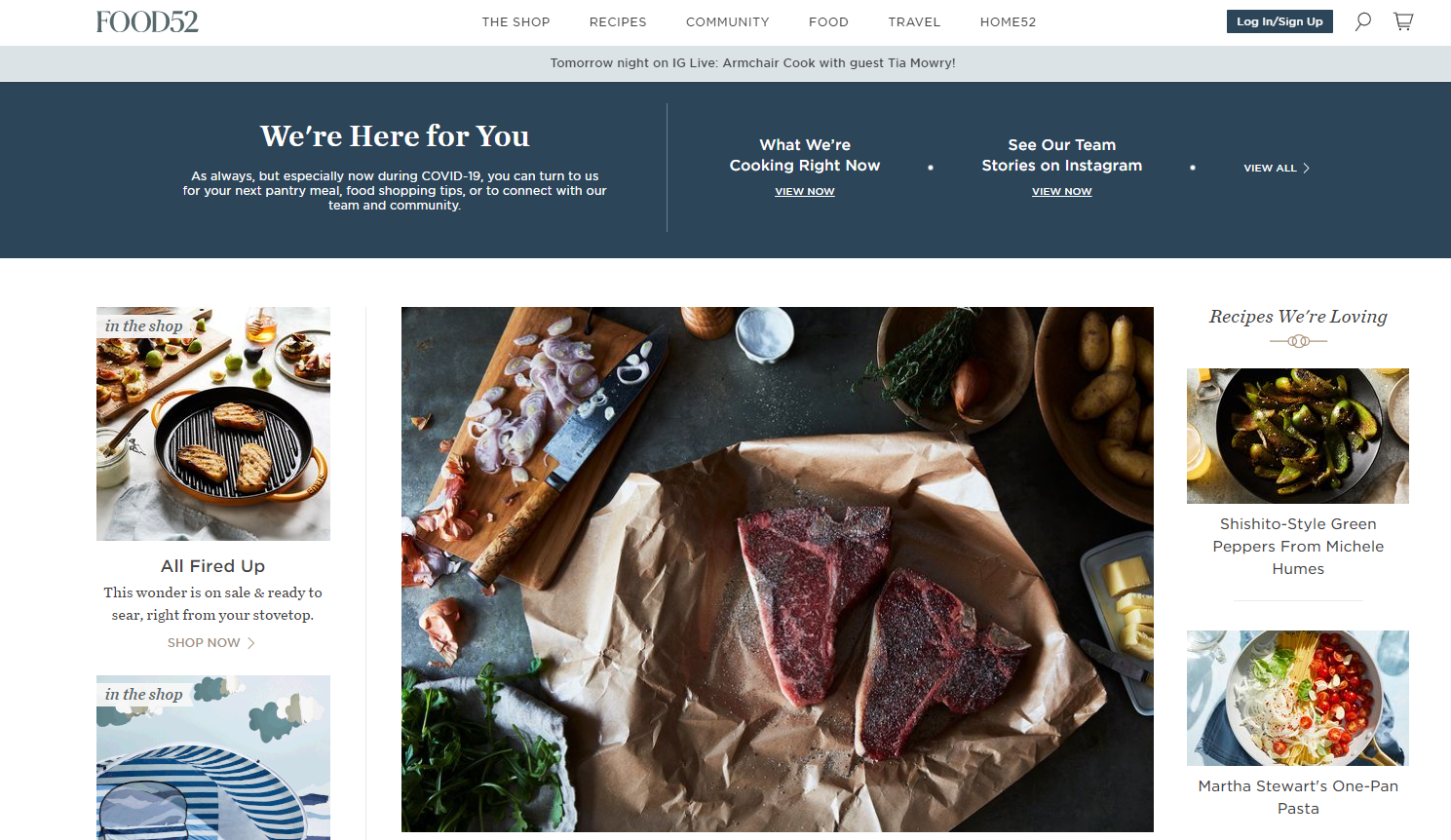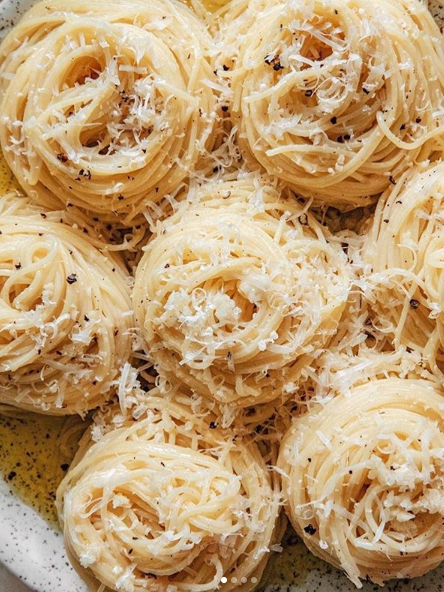Suzanne D'Amato, Curating Food52's Brand & Voice
May 26, 2020
If you're looking for recipes to produce some mouth-watering goodies, you probably have already stumbled onto Food52. Meet Suzanne D'Amato, SVP of Brand at Food52, a community with a mission to inspire people to eat thoughtfully and live joyfully. Prior to joining the company in August 2017, Suzanne was the executive editor and food editor at SELF. She's also worked as an editor and writer at People StyleWatch, Domino, The Washington Post, Teen Vogue, Vogue, and New York Magazine, in addition to teaching writing classes at New York University.
In this feature, Suzanne shares with us the lessons she learned at Vogue, her experience launching a brand consulting business, and what ultimately drew her to Food52. Read along to soak up her incredible career advice for ambitious women, such as yourself.
Early Career
You studied English at Berkeley, and then pursued a role as a fashion writer for Vogue. How did you go about landing that first job at what most would call the world’s most coveted fashion magazine?
This may surprise some people, but I didn’t start out with major fashion connections. I was an editorial assistant at New York magazine, a job I’d landed after several internships in magazine and book publishing. My main job was answering phones, but occasionally I wrote a little shopping copy—new store openings, product previews, etc. A coworker told me about the role at Vogue and encouraged me to apply.
Just going into the offices was terrifying—everyone who works at Vogue basically looks like they’ve stepped out of the pages of the magazine. I remember wearing a blazer I’d bought at Century 21 that was really expensive for my budget at the time, and thinking it was totally the wrong thing to wear, too corporate. I met with Amy Astley, who was charming. She gave me a copy test to take home. I spent hours poring over that test, which is funny because I think it was 150 words of copy at most! But I’d been reading Vogue for years and felt pretty good about what I turned in.
I then got called in for an interview with Anna Wintour, which was the last step before getting an offer. To say I was nervous was an understatement—I remember feeling slightly dizzy as I walked into her office. We spoke for 10 minutes at most; I managed to share the names of a few designers I liked, and I also gently pushed back when she noted my lack of market experience. In the end, I think the combination of writing ability and backbone probably got me the job.
After spending four years in the world of fashion at Vogue / Teen Vogue, you transitioned to The Washington Post. What prompted that move, and how did your early career at Vogue benefit you in your role at the Post?
I’d worked for Amy at Vogue for two years and then moved on with her to launch Teen Vogue. We had a strong working relationship and the whole launch team at Teen Vogue was incredible—I’m still friends with many people from that time. But I wanted to learn more about different types of writing beyond fashion, beauty, and celebrity. I’d never gone to journalism school, so I also was eager to understand more about how reporting worked. I couldn’t have asked for a better place to learn than The Post. I worked alongside some of the best journalists in the world, and it just opened my eyes. People stay at a place like Vogue for a decade or longer, but there’s a lot to be said for working at different places and learning from each experience—you can see how different teams operate, how different editors edit your copy, and come to your own definition of what good work looks like.
Of course, there was so much I took from Vogue that benefited me at The Post—and in every job since! Vogue taught me professionalism: Be on time for meetings. Make sure you’re prepared, and have something real to say—don’t just talk to take up space. Do your best work, and remember that little things like headlines and captions matter as much as the big stuff. The Post newsroom was a much less formal place, but those principles benefited me because they helped me be seen as someone reliable. I was young for my position—I was 26 and a Deputy Editor—so I had a little bit to prove. I think the way I worked may have inspired some senior editors to assign me more ambitious projects.
Over the next several years, you continued to move up and eventually became the Executive Editor for two major magazines - People StyleWatch & SELF Magazine. As you rose from writer to editor to executive editor, what skills did you gain that helped you later in your career?
One thing I got really good at was headlines. That’s all thanks to People StyleWatch. That magazine had no articles—just headlines and captions!—so each word had to carry a lot of weight. I learned to more or less think in headlines, and to be able to think them up on the spot, which is a transferable skill that has helped me come up with new franchises at Food52 such as “Big Little Recipes,” “A Pan & A Plan” and “Small Change, Big Impact.” (Weird factoid: Sometimes I dream up headlines in my sleep!) Headlines help crystallize an idea—and if you can give your idea a clever name, it can go a long way in selling it.
As an Executive Editor, you also spend a lot of time working on the business side of things: partnerships, events, retail. Some editors absolutely hate that part and would rather just edit copy all day. But I loved it, and it made me realize that as much as I appreciate the journalistic rigor of a place like the Post, I’m ultimately a commercially-minded editor. This was helpful in considering whether I wanted to make a move to the brand world.
Brand Consulting & Food52
After SELF, you launched your own brand consulting business. What did you learn about yourself while self-employed, and what advice do you have for women early in their career who aspire to run their own business one day?
Most of my contacts were in media, so I needed to branch out more. I was happy to remember that I actually love networking. Meeting new people and learning about different industries takes me out of my bubble and helps me remember how wide-open the world is. The trick is to approach it optimistically but without too many expectations, and to trust in people’s kindness. There were some people I didn’t even know very well who went out of their way to make introductions for me, which was really surprising and encouraging.
One thing that was initially hard for me was resisting the urge to work seven days a week. I was so used to office-life boundaries, and working from your apartment dissolves all that. So I tried to really set up my days as workdays, Monday-Friday from 9 to 6, with breaks. It’s something I’m reminding myself of again now that we’re all WFH.
A tip that I would have for women who may want to start their own businesses one day is to try to keep your overhead low. I’ve always been pretty thrifty, so I didn’t have a hugely expensive lifestyle to maintain once I was freelance. This meant I could be a little more choosy about which projects I wanted to take on. Maybe something didn’t pay all that well, but it was a great resume builder—I could say yes and get that experience. Obviously that kind of flexibility isn’t an option for everyone, but if it’s possible for you, it will give you more room to explore.
After your stint in brand consulting, you landed a job at Food52 as Editor-in-Chief. How did your roles leading up to Food52 situate you well to take on the challenge of entering a brand-new position?
I’ve never consider myself a food expert, but the world of Food52 was familiar to me because I’d been a food editor at SELF and Domino. I’d also worked on all sorts of digital media projects over the years, from email newsletters to social campaigns. What intrigued me most about Food52 was the company’s model—very strong, well-regarded editorial, but then also an equally robust e-commerce business, plus podcasts and cookbooks and events. The diversification is something other media companies dream of. At that time, I was pretty burned out on traditional publishing, which is still centered on an ad sales–driven model—print advertising in particular. I felt like there was room for me at Food52 to lead and mentor a young editorial team and work on the things I already knew well—franchises, editorial calendars, line-editing, and so on—while also learning about this new model.
I think every role I’ve had has helped me succeed at Food52. At a startup, there’s less inherent structure—each day, you have to figure out the best way to do twenty different things, and a lot of those things probably will be brand-new, so you may not have any precedent to draw from. The wide range of experiences I’ve had gives me a strong foundation for what I do in the day-to-day.
Today, you are the SVP of Brand for Food52, where you own the company’s voice across all audiences and channels. You’ve achieved so much, and I know so many young women look at your career with a feeling of admiration and aspiration. But I imagine it wasn’t easy getting to where you are today. What has been the biggest challenge in your career, and how did you overcome it?
Just figuring out how to get out of my own way, be confident in my abilities, and in general, worry less. I used to spend so much time fussing over a random mistake I’d made. But generally speaking, no one is thinking about your work as much as you do. My best trick for worrying less has been to remember that work is just one part of my life. An important part! But not everything. Thinking about all the other things I care about, and making sure to invest time in those things, helps put work in perspective.
Advice
What do you wish you knew when you were first starting your career?
It will all be OK, until it isn’t—but even then, you’ll figure it out. I used to be terrified of the idea of losing my job. Now, I’ve been laid off twice, and challenging as those experiences were, they really helped me think through how I wanted to set up my life and what I wanted out of my career.
What advice do you have for young women in their early career who are interested in pursuing a career in media?
Read as widely as you can, and begin cultivating your sense of what good writing looks like. Get some practice: Join a school paper or literary magazine, and write as much as you have time for. Cast a wide net in your internship or job search—there are so many amazing companies out there beyond the household names, and starting off at a smaller company may mean you get to do more.
Who is one woman you aspire to be like?
My mother, who has faced many challenges in her life without losing her optimism, empathy, or sense of humor.
What did you think? Let’s chat. Comment below!
OUR MISSION
Empower future female leaders
JOIN OUR COMMUNITY
Inspiring interview delivered each month
You might also like…
Check out our interviews…










